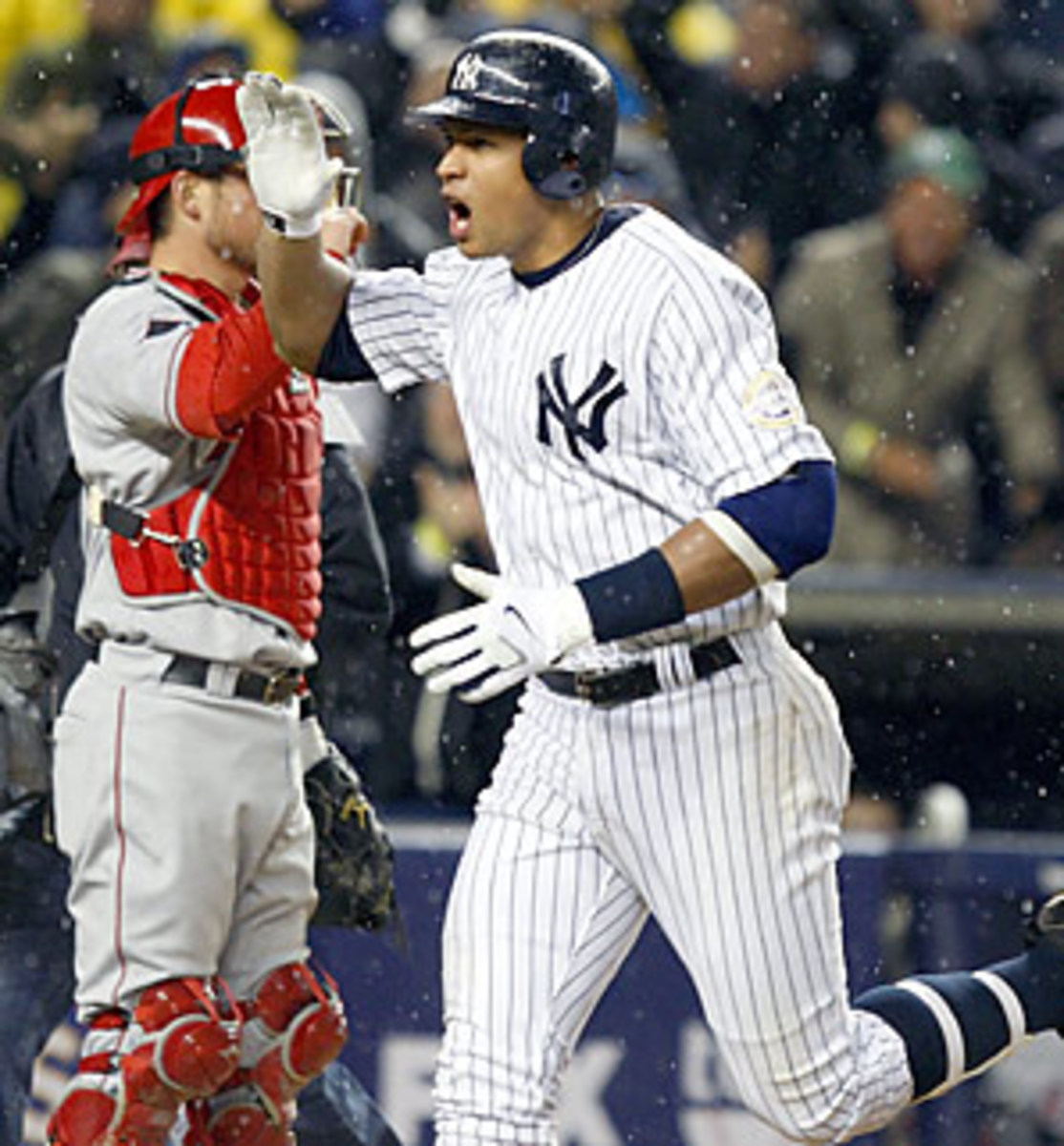A-Rod, role players come through for Yankees in Game 2
The Yankees' payroll this season is approximately $206.8 million, nearly $68 million higher than that of any other club, but even the Yankees have players, like Coke (salary: $403,000), who don't make nearly enough to fly first class, or to build the biggest house in Tampa, or to spend their off-days in South Beach with Hollywood ingénues. Eleven players on the Yankees' 25-man ALCS roster earn $2 million a year or less, and eight earn less than $500,000. On a brisk, rainy and seemingly endless Saturday night in the Bronx, those players were the ones who ultimately won Game 2 of the Yankees' ALCS against the Angels after five hours and 10 minutes of play, and who sent them west with a commanding 2-0 series lead.
As 1 a.m. approached in the Bronx, after twelve hard-fought if sloppy innings -- the teams combined to make five errors -- both the Yankees and the Angels had whittled their rosters down to their last splinters, and the game remained tied at three. The Yankees had just two position players lingering on their bench, in Jerry Hairston and Francisco Cervelli, and one pitcher sitting alone in their bullpen, Chad Gaudin. So it was left to David Robertson (salary: $407,000), a seventeenth round pick in 2006, to shut the Angels down, and he did. Robinson Cano allowed Erick Aybar's leadoff grounder to skip under his glove (it was Cano's second error, proving that we should never expect great things from men who wear ski masks in playoff games), but Robertson eventually worked out of the jam, inducing a groundout to second from Vladimir Guerrero with men on second and third.
Then it was the Yankees' turn to bat, and manager Joe Girardi called upon Hairston (salary: $2 million) to pinch-hit for backup outfielder Freddy Guzman (salary: $400,000). Angels pitcher Ervin Santana, an All-Star last year but a long reliever in these playoffs, threw him three straight sliders, and he hit the third on a line to center. Then it was time for backup outfielder Brett Gardner (salary: $414,000) to sacrifice Hairston to second, which he did with aplomb. Then, after an intentional walk to Cano, Melky Cabrera (salary: $1.4 million) hit a hard grounder to second baseman Maicer Izturis, and Izturis -- beware, men in ski masks! -- threw the ball past shortstop Erick Aybar, and Hairston, running aggressively, crossed the plate with the winning run, giving the victory to Robertson.
In the end, both the Yankees and the Angels were down to nothing, and the Yankees' nothing was better than the Angels' nothing. Of course, the Yankees wouldn't have lasted as long as they did in this game, which might prove to be the most memorable of this postseason, filled as it was with mini-drama after mini-drama, without their highly-compensated stars. They wouldn't have reached the 13th if not for free-agent prize A.J. Burnett (salary: $16.5 million), who was brilliant through four innings -- he threw first-pitch strikes to 12 of the first 14 batters he saw and allowed just one hit before the top of the fifth -- but then seemed to completely lose his control in the fifth, allowing a double, a single, a hit batsman, a walk, and a wild pitch. Still, even in that nearly disastrous frame, Burnett limited the Angels to only two runs, and he somehow lasted into the seventh.
And the Yankees certainly would not have reached the 13th without Alex Rodriguez, the most handsomely paid of them all (salary: $33 million). The Angels had manufactured a run, as they are wont to do, against reliever Alfredo Aceves in the top of the 11th, and manager Mike Scioscia inserted closer Brian Fuentes with a 3-2 lead. On Fuentes' third pitch, a 90 mile-an-hour fastball, Rodriguez took an inside-out uppercut swing and sent the ball soaring the other way. It landed just over the right field wall, giving Rodriguez an RBI for the sixth straight postseason game and making him just the third player ever, according to the website baseball-reference.com, to hit a game-tying home run in extra innings of a postseason game. "When Al hit that game-tying home run," Hairston said later, "We knew something special was happening."
No one is really sure what has happened to Rodriguez, who once upon a time struggled in the postseason. "I know you guys are probably looking for something profound," he said to reporters after the game. "I'm just in a good place. I'm seeing the ball and I'm hitting it." Later he said, "I think [it goes] back to spring training. It was a rough one this spring. I thought making things simple was the best thing for me ... the fact that I'm out there playing baseball is a miracle."
There might be some truth to that -- to the idea that Rodriguez, after suffering through a spring in which he sustained a potentially catastrophic hip injury and was revealed to be a user of performance enhancing drugs, has now experienced far worse situations than a key playoff at-bat, and that the latter now seems easy to him. "I'm not a psychiatrist or psychologist or whatever," said general manager Brian Cashman the other day, "But he looks so relaxed. I know he's enjoying himself. I know he feels good about himself."
So this, now, is the situation with which the Angels are faced: an Alex Rodriguez playing at his absolute peak, even though it's October; a Yankees team that seems incapable of losing, even if it takes the last men on their roster to close things out; and a continuing inability by Angels fielders, it seems, to avoid making crucial errors in crucial situations. "I'm encouraged by what I saw on the field," Angels manager Mike Scioscia said after this crushing loss. "We saw a lot of good things there." A lot of good things, yes. But once again, not quite enough of them.





